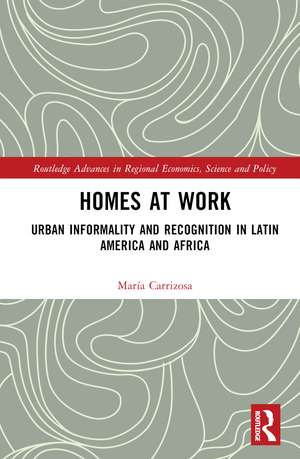Homes at Work: Urban Informality and Recognition in Latin America and Africa: Routledge Advances in Regional Economics, Science and Policy
Autor María Carrizosaen Limba Engleză Hardback – 22 mai 2023
| Toate formatele și edițiile | Preț | Express |
|---|---|---|
| Paperback (1) | 311.48 lei 6-8 săpt. | |
| Taylor & Francis – 28 noi 2024 | 311.48 lei 6-8 săpt. | |
| Hardback (1) | 893.90 lei 6-8 săpt. | |
| Taylor & Francis – 22 mai 2023 | 893.90 lei 6-8 săpt. |
Din seria Routledge Advances in Regional Economics, Science and Policy
- 9%
 Preț: 1005.62 lei
Preț: 1005.62 lei -
 Preț: 310.60 lei
Preț: 310.60 lei -
 Preț: 325.38 lei
Preț: 325.38 lei -
 Preț: 282.46 lei
Preț: 282.46 lei - 26%
 Preț: 763.78 lei
Preț: 763.78 lei - 26%
 Preț: 764.20 lei
Preț: 764.20 lei -
 Preț: 389.66 lei
Preț: 389.66 lei -
 Preț: 118.49 lei
Preț: 118.49 lei -
 Preț: 264.59 lei
Preț: 264.59 lei - 31%
 Preț: 765.40 lei
Preț: 765.40 lei -
 Preț: 389.66 lei
Preț: 389.66 lei - 26%
 Preț: 765.40 lei
Preț: 765.40 lei -
 Preț: 389.66 lei
Preț: 389.66 lei - 13%
 Preț: 317.58 lei
Preț: 317.58 lei -
 Preț: 389.66 lei
Preț: 389.66 lei - 16%
 Preț: 276.29 lei
Preț: 276.29 lei -
 Preț: 389.66 lei
Preț: 389.66 lei - 18%
 Preț: 699.96 lei
Preț: 699.96 lei - 18%
 Preț: 1000.27 lei
Preț: 1000.27 lei -
 Preț: 389.38 lei
Preț: 389.38 lei - 18%
 Preț: 1162.39 lei
Preț: 1162.39 lei - 18%
 Preț: 1004.68 lei
Preț: 1004.68 lei -
 Preț: 449.41 lei
Preț: 449.41 lei -
 Preț: 389.66 lei
Preț: 389.66 lei - 25%
 Preț: 768.82 lei
Preț: 768.82 lei - 22%
 Preț: 325.00 lei
Preț: 325.00 lei - 26%
 Preț: 764.20 lei
Preț: 764.20 lei -
 Preț: 389.66 lei
Preț: 389.66 lei - 18%
 Preț: 1000.27 lei
Preț: 1000.27 lei - 16%
 Preț: 263.77 lei
Preț: 263.77 lei -
 Preț: 346.92 lei
Preț: 346.92 lei - 26%
 Preț: 766.07 lei
Preț: 766.07 lei - 18%
 Preț: 1003.43 lei
Preț: 1003.43 lei - 13%
 Preț: 297.37 lei
Preț: 297.37 lei - 12%
 Preț: 301.97 lei
Preț: 301.97 lei - 13%
 Preț: 294.65 lei
Preț: 294.65 lei - 28%
 Preț: 852.87 lei
Preț: 852.87 lei
Preț: 893.90 lei
Preț vechi: 1090.12 lei
-18% Nou
171.04€ • 179.07$ • 141.53£
Carte tipărită la comandă
Livrare economică 05-19 aprilie
Specificații
ISBN-10: 1032286237
Pagini: 248
Ilustrații: 5 Tables, black and white; 43 Line drawings, color; 37 Halftones, color; 80 Illustrations, color
Dimensiuni: 156 x 234 x 16 mm
Greutate: 0.53 kg
Ediția:1
Editura: Taylor & Francis
Colecția Routledge
Seria Routledge Advances in Regional Economics, Science and Policy
Locul publicării:Oxford, United Kingdom
Public țintă
PostgraduateCuprins
1. Introduction 2. Urban informality: mainstream theories and visible alternatives 3. Space-use intensity in informal settlements in Bogotá 4. The politics of urban formalization in Bogotá 5. Space-use intensity and urban formalization in African cities 6. Conclusion
Notă biografică
Descriere
Following the outbreak of the COVID-19 pandemic working from home became a global phenomenon, yet before 2020, it was a relatively understudied practice. But in informal settlements, the definition of ‘home’ and ‘employment’ is completely intertwined, which is why there is so much to learn from them. For over half a century, mainstream theoretical approaches to urban informality, dominated by development economics, often fail to see this economic and spatial phenomenon jointly. Labor studies tend to be space-blind and spatial studies often disregard informal employment. Profoundly interdisciplinary, this work connects scholarship in development, public policy, labor studies, and feminist economics, with that in urban studies, planning, housing, architecture, and visual studies.
The book walks the reader behind the closed doors of working homes that make the fabric, both social and economic, of most cities. It applies a visual methodology to reveal their "space-use intensity" and quantify the extent to which houses in informal settlements fill their inner pores with economic activity and community services. The research also revisits urban formalization policies Latin America and Africa, to uncover a fallacious politics of recognition. It ultimately argues for a recognition continuum: an approach to urban informality that is more practical and fairer.
The book will be of interest to development economists, urban scholars, public policy specialists, time-use researchers, and architects working on housing, employment generation, urban livelihoods, gender studies, and related topics.
